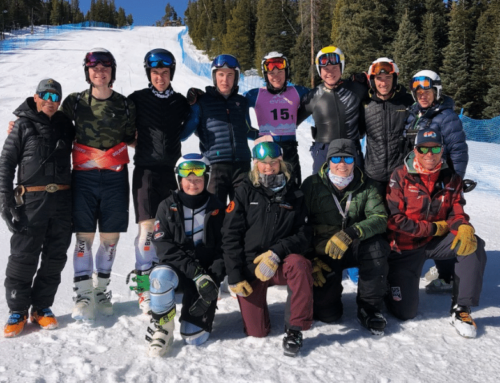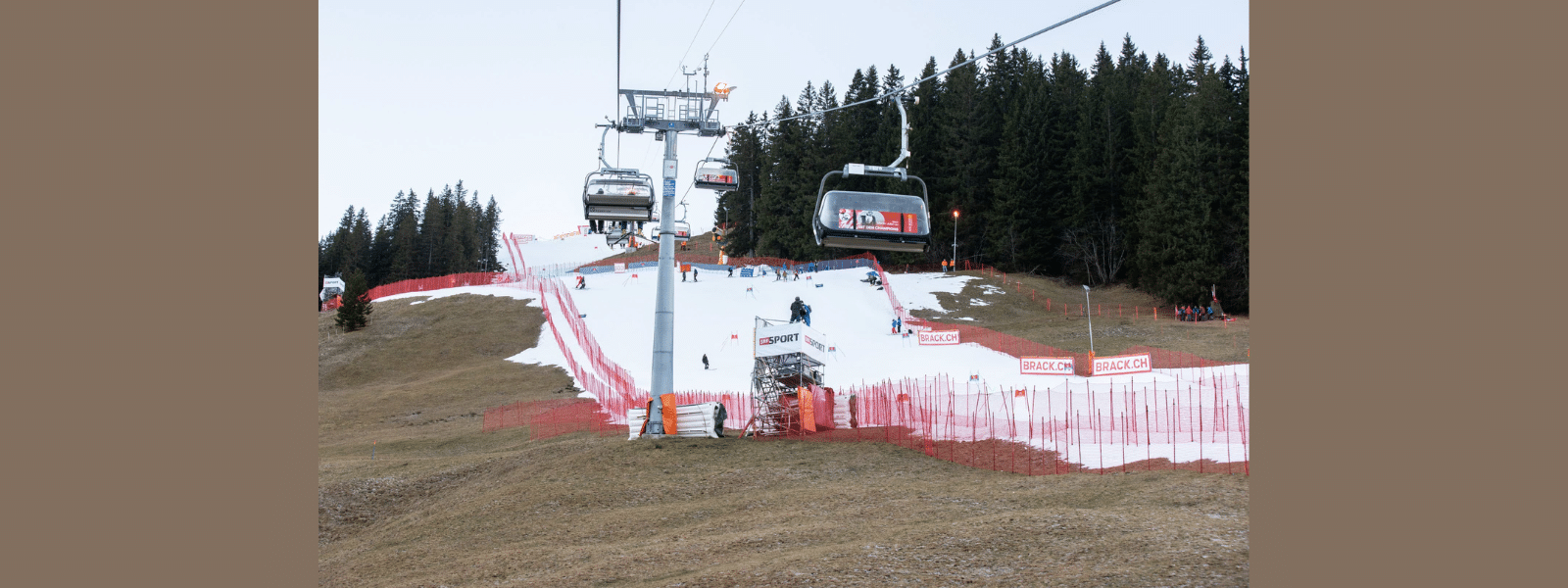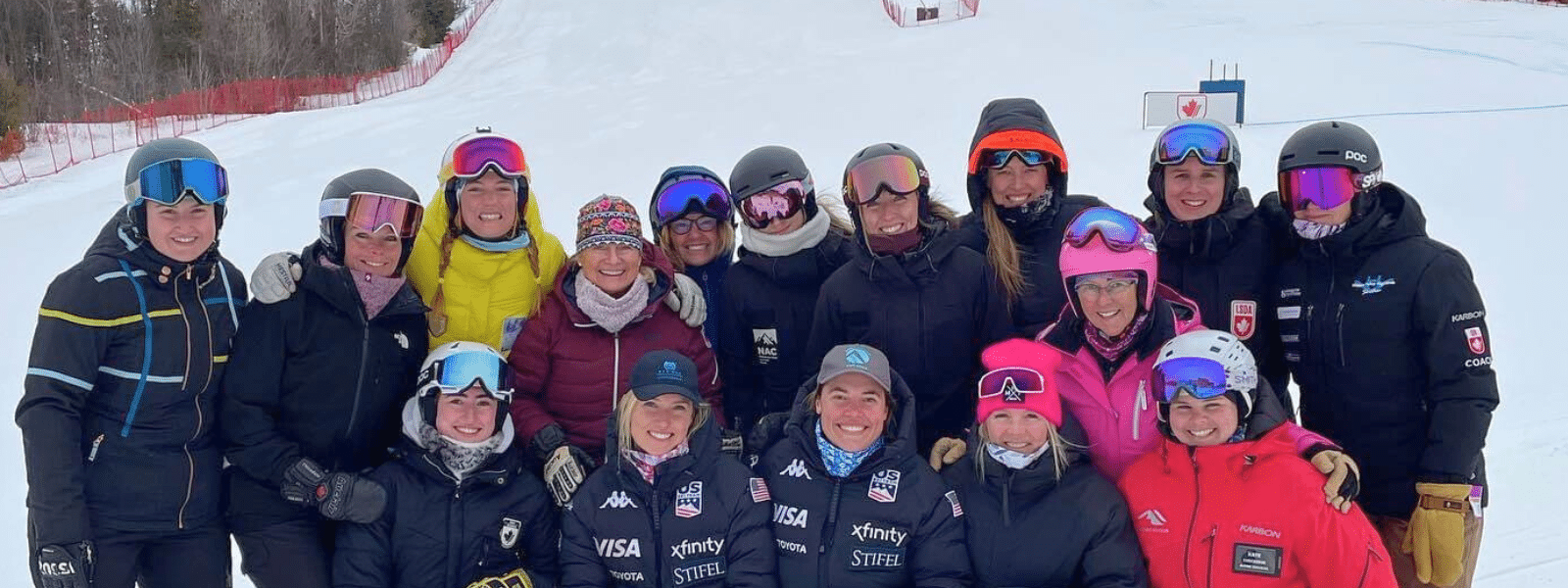An Argument For USCSA
If you think your ski racing career is over after high school, think again. Just because you didn’t become an NCAA athlete, or join U.S. Ski & Snowboard’s development team, does not mean that you should trade out your racing skis for a backcountry quiver just yet. Racing in college via the USCSA (properly known as the United States Collegiate Ski & Snowboard Association) is as good an option as any for athletes (like me), that love the sport and want to keep competition a part of their lifestyle.
From fully-funded teams that run on scholarship and mimic an NCAA coaching staff, to schools that have a club team with a handful of ex-FIS and USSA racers, a total of 145 colleges across 11 conferences in the United States and Canada have programs participating in USCSA. And if a team does not already exist at a student’s college of choice, it’s easy to seek out the university’s club sports program and get one started. USCSA welcomes individual athletes and budding programs each year. In the 2018-19 season, it served a total of 4,953 student-athletes across alpine, freeski, snowboarding, and nordic disciplines with 70% of those students listed as alpine athletes.

The numbers may indicate that there are plenty of students taking advantage of USCSA across the nation, but Alec Tandara-Kuhns, the current Executive Director of USCSA, has noticed there is a continued misperception about what USCSA is. Since the late 1960s, USCSA has been around to offer students an option to continue on their ski racing careers at any level that they desire. Yet despite being in operation for 40 plus years, the conference tends to be overlooked at the highest level of the sport. Not many people within the ski racing community at the club and academy level fully understand the size, the breadth, and the history behind the organization.
USCSA has yet to fully integrate with U.S. Ski & Snowboard, and therefore operates as its own entity, majorly on a volunteer basis, which is why Tandara-Kuhns believes there is a continued misperception surrounding its legitimacy as a post-high school option. During spring conferences at U.S. Ski & Snowboard this past May, Tandara-Kuhns sat on a panel to discuss collegiate skiing with six other participants. He represented close to 5,000 athletes, while the other six men represented around 300.
“Ironically we are a huge part of the industry, we’ve been at this for a very long time,” he says. “But, when talking to coaches and ski club administrators and parents, a lot of them don’t understand what USCSA is as an option and how big we actually are, or how long we’ve been around. There’s just that one missing piece. Predominantly we are a stand-alone organization, so we don’t have the same access to parents or development pipelines that USSS has. So some of the finer points of what USCSA is gets lost in that in-between.”
So, what exactly is USCSA?
Put simply, it’s a competitive league of snowsports that allows students to be athletes, without the same kind of pressures they might have experienced as a kid because there is no expectation to perform on the national stage if it’s not in an athletes wheelhouse. Students can ski race, because they love to ski race, and continue to pursue their careers without the worry of having to balance school and sport in the same way an NCAA athlete does. Yes, NCAA athletes are student-athletes, but as recruited, funded athletes there is no denying their focus and their priority is on performance. The value in USCSA comes from an athlete’s ability to remove the pressure often put on them while participating in the sport growing up, and once again finding the joy in skiing. Not only do folks who participate in USCSA get to continue their racing career well past high school, but they also have the capacity to build their careers and resumes while keeping competition a part of their lives.
“Athletes in college are trying to figure out who they wanna be in life, where they wanna go, how far they wanna take their sport, and the USCSA does a really really good job with their team-based approach, building and fostering that identity and making an athletes time with their ski club and with their freestyle team really special and in a lot of cases, one of the defining things in their college career,” says Tandara-Kuhns. “That’s why I think the USCSA is extremely important to the industry. We have anecdotal evidence of kids staying in the sport a lot longer, or staying in the industry a lot longer, because of their time with USCSA.”

Ron Bonneau, the Program Director and Head Coach of the College of Idaho Alpine team, is kicking off his 30th year running a fully-funded program in the USCSA. This year, he will wrap his last season as Executive Director of the Northwest Conference of USCSA and Collegiate Committee member with U.S. Ski & Snowboard. He’s stuck with the program for years on end because he finds joy in watching student-athletes evolve – seeing where they go and what they do with their lives after their time in the sport and in college. To him, USCSA provides an opportunity for pretty much anyone who wants to try and continue to pursue ski racing, to experience the sport maybe even for the first time, and his goal was to foster this philosophy within the sport for as long as he could.
“USCSA has been a diamond in the rough, not really well-known or widely promoted as well as it could be and should be,” says Bonneau. “Everybody wants to be a part of something, it’s human nature. We want to be inclusive, we want to be involved, and to be invited and to have the opportunity to know that the door isn’t closed because of quoted numbers or exclusivity. For those of us who like to chase each other up and down the hill, and high-five each other at the end of the day, there’s an open door for that. It’s a real gift that the USCSA can, and does, provide.”
USCSA is as much about the individual as it is about the community. It’s highly focused on team due to its volunteer-based business model. Each individual on a team plays a role in making the machine run smoothly, and beyond that, each team plays a role in making each race day, regional competition, and national competition, a possibility. Everyone has an expectation to participate not only for themselves but as Bonneau says, for the greater good of the program. The team run by a full coaching staff, and the team run by student-athletes, is just as important as the next.
This structure not only allows USCSA athletes to take full advantage of their time in college as students, but it also allows them to find joy in the sport of ski racing in a team-oriented environment versus that of an individualistic one. When the athlete is competing for a team and not just themselves, it removes weight and pressure that can often times making race day daunting and more strenuous than it should be. Ski racing can be fun again. Bonneau keeps this in the back of his mind when recruiting athletes. His selections are not solely based on performance, FIS profiles, or film. A majority of his choices are made based on the soft skills it takes to be a good teammate.

“I’m very intentional in terms of looking for team players and individuals who have that willingness to be able to share and look beyond themselves and see the value in each of their teammate’s abilities,” says Bonneau. “The teams that I’ve had that have been able to genuinely go out and laugh and share each other’s experiences, challenge each other, and enjoy each other’s company have been the most successful in terms of producing results. Once you can relax, you can perform. When that weight comes off your shoulders, and you know you have the support of your teammates, your performance level will increase. My challenge to the student-athletes is, the best results came on the day you laughed. So let’s go laugh together and have more best days. ”
“My challenge to the student-athletes is – “the best results came on the day you laughed. So let’s go laugh together and have more best days.” “
Ron bONNEAU
These concepts are not lost on me as a Staff Writer for Ski Racing Media. I came into ski racing late in the game, and USCSA allowed me to keep a sport that brings me joy a major part of my life. When I graduated from the University of Oregon in the Spring of 2018 with two Bachelor’s degrees, I was more than equipped to take on a job that asked big things of me. Because in addition to earning dual degrees, participating in my university’s honors program, defending an undergraduate thesis, having a job, and studying abroad, I was able to ski race.
I chose to continue racing as a way for me to escape the turmoil of my day to day by running away to the mountains for a weekend to hang out and compete with some of my favorite people – to have fun and enjoy a sport I love while I focused on building my life. After my freshman year, I jumped into leadership roles as Treasurer and eventually President of the University of Oregon’s Alpine Ski Team to continue adding to my resume (and having fun, of course). The experience of organizing my own team (in lieu of having no coach), handling budget, lodging and race logistics, managing athletes from ex-FIS racers to racers who had only ever skied NASTAR, and much more, gave me the tools I needed to succeed at the level I am now.
What the USCSA gave me, and what it gives to all of its alumni, is the capacity to choose who they want to be and not sacrifice their careers or other personal interests for the sport, all while continuing to compete at a high level. With USCSA, the sport acts as a supplement to living a great life. The pressure to perform and execute each run is gone, the expectations that exist are the kinds that competitive athletes put on themselves. And that’s what keeps them involved.

Looking back on this experience as I travel the World Cup circuit and report on athletes competing at the highest level of the sport, it’s clear to me that my time in USCSA played a huge role in keeping me connected with alpine physically, but most importantly, emotionally and mentally. If I skied out or skied slow, I didn’t feel the same sense of failure I felt when I was in high school. My mishaps were forgivable. I was having fun anyway and was going to loop back up to the top of the course to cheer on the rest of my teammates and friends competing for other schools in the field. And I know I was not the only athlete who felt this way. Many of my teammates and competitors, who went on to become some of my most valued friendships, look back on USCSA as a highlight of their college career. Why? Because it gave them the opportunity to fall in love with the sport again.
Ex-USCSA athletes are the kinds of volunteers that keep the program running. They’re the parents that teach their kids how to ski at an early age. They’re the fans that continue to race in Beer Leagues and NASTAR, the ones that tune in and watch World Cup races, World Championships, and the Olympics. They’re the people that help fill the stadiums at Beaver Creek and Killington World Cup. They play a huge role in the ski racing community, by helping keep the stoke alive for the love of skiing.
“This is the future of ski racing as it evolves,” says Bonneau. “Looking at it from a practical sense, these are your future parents, these are people who have are going to likely be able to continue with the sport, to encourage their sons and daughters to pursue the sport because they had such a positive experience. Show ‘em a good time, and they will come back.”





















